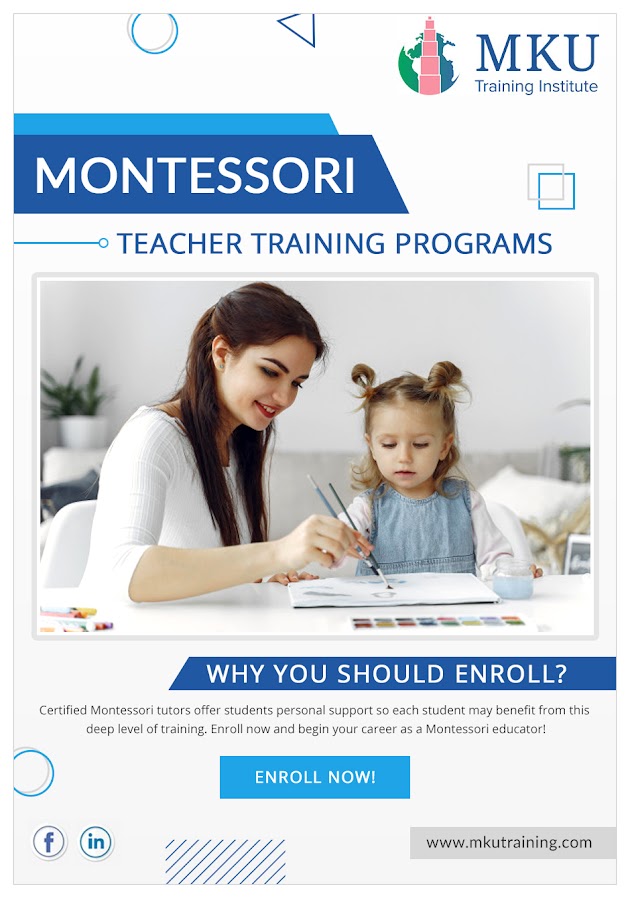You will come across numerous Montessori programs on the internet, but only a few of them are to be trusted. Choosing the right course is always a rewarding affair. So, you have to consider some aspects before picking the one for you.
Teaching is the noblest of all professions. If you aspire to be a Montessori teacher, it’s well and good. However, choosing the right Montessori training center is a cumbersome task as there are numerous options. You are bound to get burdened by options. Having a clear idea about what you want to achieve through Montessori education is a good option as you can be aware of the dos and don’ts. Given below are the five things you should consider before choosing a Montessori training program:
Choosing the right Montessori training center is a tricky affair as there are several aspects to consider. It’s not easy to meet all the ends, and for that to happen, you have to research a fair bit. Consider the above factors and make the best decision of getting admitted into the right Montessori training course.
Are you aspiring to be a Montessori educator and looking for the right Montessori training program? Well, the experts at https://mkutraining.com have all the needs covered for you. Here, you get access to the best quality training from professionals who are acquainted with the various facets of Montessori training. And more importantly, you can avail of this training without burning a hole in your pocket.
- Location and schedule: It is undoubtedly the first thing you should consider. However, if the program is offered in distance mode, you don’t have to worry about these aspects. Not everyone happens to live within the vicinity of a good Montessori training institute. The benefit of choosing an online or Montessori distance education program is that you don’t have to travel, and you can study at any time of the day.
- Probe into the experience of the Montessori teachers: You can’t give a blind eye to this aspect under any circumstances. Before opting for a program, you should look at the experience of the Montessori trainers. If they are in this domain for more than five years, they can be considered reliable. Nobody will prefer to hire a Montessori teacher who is an amateur. You also need to check the philosophy of the training staff. Look whether the teachers are influenced by Montessori’s original ideas and theories or by other educational methods. If possible, you can watch their videos and webinars. This will help you to know them in a precise fashion.
- Brand legacy: You also need to check the brand legacy of the institute. Carefully research the background of the Montessori training center before pursuing a teacher training course. In this way, you can easily differentiate an excellent institute from a mediocre one. A good Montessori training institute has a brilliant track record, state-of-the-art alumni, and top-notch faculty members. Before getting admitted to a Montessori teacher training institute, ensure that the institute is in the business for a considerable period of time.
- Training methodology and curriculum: The institution you pick must have well-structured courses coupled with effective teaching methodologies. The curriculum needs to cover a diverse spectrum of teaching and provide aspiring teachers with in-depth knowledge about teaching methodologies and the latest teaching theories.
- Fee structure: It is another crucial factor that will determine your choice. Will you spend all the money for completing a teacher training course? Obviously not. At the same time, you will prefer to complete the course from the best institution. However, you shouldn’t forget to enquire other institutions about the fees. This will give you a clearer picture. Don’t fall into the trap of institutions that want to convince you only with their fee structure.
Choosing the right Montessori training center is a tricky affair as there are several aspects to consider. It’s not easy to meet all the ends, and for that to happen, you have to research a fair bit. Consider the above factors and make the best decision of getting admitted into the right Montessori training course.
Are you aspiring to be a Montessori educator and looking for the right Montessori training program? Well, the experts at https://mkutraining.com have all the needs covered for you. Here, you get access to the best quality training from professionals who are acquainted with the various facets of Montessori training. And more importantly, you can avail of this training without burning a hole in your pocket.






